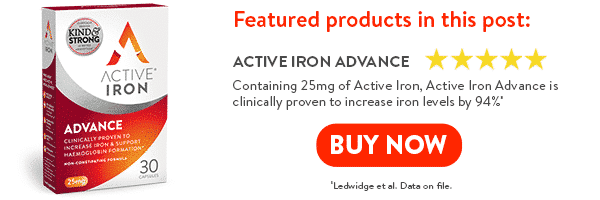- Iron supplements for blood donors
- Oral iron supplements
- Do Iron Supplements Cause Constipation?
- Iron supplements for athletes
- The best iron supplements for vegetarians
- The best iron supplement for sensitive stomach
- Benefits of iron for your immune system
- How to take iron supplements for best absorption?
- What does iron saturation mean?
- What is the Function of Iron in our Bodies?
- Iron supplement side effects
- How Much Iron Per Day for a Woman?
The importance of iron supplements for blood donors
If you are a regular blood donor or are considering donating, you might be considering iron supplements for blood donors. As iron loss is a side effect of donation, blood donors often have an increased need for iron. Taking an iron supplement for blood donors, like Active Iron, is a simple and effective way to restore iron levels after blood donation.

In this article on iron supplements for blood donors, we’ll cover the following key topics and frequently asked questions:
- Benefits of giving blood
- Iron loss and the effects of giving blood
- The importance of restoring iron levels after blood donation
- How much iron should blood donors take?
- Who should take iron supplements after donating blood?
- Iron supplements for blood donors
- How to maintain iron levels when donating blood
Benefits of giving blood
Blood donation is a selfless and voluntary act that strengthens communities and supports our health system. As many as one in four people¹ will need a blood transfusion at some point in their lives. These include those undergoing surgery, recovering from cancer or having been in a serious accident. Blood donation is critical to their recovery and ability to lead healthy lives.

As such, the volume of blood required to treat the thousands of patients that require blood transfusions in hospitals every year is quite considerable. In the case of a car accident, for example, a victim could need up to 30 units of blood. While a bleeding ulcer could require anything between 3-30 units of blood, and a coronary artery bypass may use between 1-5 units of blood.
To meet this demand, we rely on voluntary blood donors. However, while all adults have 10-12 pints of blood on average, only a tiny percentage become regular donators.
Iron loss and the effects of giving blood
If you are a regular blood donor or are considering donating, it’s essential to be aware of the effects of blood donation and how it affects your iron levels. When you donate one pint of blood, your body immediately gets to work rebuilding the deficit or replacing the deficit red blood cells – up to 2.4 million new blood cells per second!
After donating, your body uses iron to make haemoglobin for new red blood cells, which transfer oxygen around our bodies. However, when you donate blood, as well as red blood cell loss, you lose, on average, 220-250mg of iron.

Special cells in the kidneys sense the decreased level of oxygen in the blood after donation, and the significant dip means that it may take up to 24-30 weeks² to build up stores again to the levels pre-donation. That time may vary, depending on your iron level before donating.
The importance of restoring iron levels after blood donation
Iron is a vital mineral that plays a crucial role in many bodily functions, including energy production, cognitive function and immune function. It is critical to forming blood cells and transferring oxygen and nutrients around our bodies, helping us feel healthy and well.
Donating blood is directly tied to iron loss, so donors often don’t have enough oxygen in their blood system. As a result, blood donation can leave a donor feeling sluggish and tired, ad at increased risk of low iron. After donating blood, your body will naturally absorb the iron it needs from food. As such, experts recommend a balanced, iron-rich diet to help restore your iron levels.

However, even a balanced diet full of iron-rich foods may not fulfil a donor’s iron needs, and it can take months to get back to the level it was through diet alone. Many studies say that simply eating iron-rich is not enough to restore iron levels but that iron supplementation is also needed.
How much iron should blood donors take?
Everyone needs adequate iron to stay healthy, mentally and physically, but blood donors have an increased need for iron. Due to the inefficacy of absorbing iron through food alone, taking iron supplements for blood donors can help you easily maintain healthy iron levels, keeping you feeling your absolute best.
Blood donation experts often recommend a course of 30mg of daily iron for up to 6 months post-donation, depending on your gender and lifestyle.
As well as restoring iron levels after blood donation, blood donors should be mindful of maintaining iron levels between blood donations. If iron levels are low before blood donation, they will be asked to wait to donate until their levels return to normal.

If you’re a regular blood donor, it’s recommended to take iron supplements on an ongoing basis and to wait 12 weeks between blood donations to maintain healthy iron levels that will allow you to continue donating blood safely.
Who should take iron supplements after donating blood?
It is recommended that all blood donors consider iron supplements in between and after donating blood. However, some groups have an increased daily iron need and must be particularly careful. These people include women, pregnant women, active exercisers and athletes, and those on restricted diets, such as vegetarians.
While men over 18 years need 8.7mg daily iron, women aged 18-45 typically need almost twice as much, approximately 14.8mg, as they can lose up to 250 mg of iron per menstrual cycle. In addition, due to increased blood volume, pregnant women may need as much as 30-60 mg of iron daily.
Those on a restricted diet, including vegetarians of any gender, also have an increased daily iron need. While there are many benefits to following a plant-based diet, non-animal dietary iron is more difficult for the body to absorb. As a result, iron requirements for vegetarians are 1.8 times higher³ compared to non-vegetarians.
Thankfully, iron supplements for blood donors are an easy solution for all donors, regardless of gender or lifestyle, to support healthy iron levels before giving blood and restore them afterwards.
Active Iron offers a range of supplements to suit specific needs. As well as the best-selling Active Iron supplement, Active Iron’s range includes Active Iron Advance, Active Iron for Women, Active Iron for Men and Active Iron Pregnancy Plus. You can explore the full range of Active Iron products here, and if you need help determining which product best suits your needs, email us at info@activeiron.com.
Iron supplements for blood donors
If you regularly donate blood, iron supplements for blood donors are a reliable way to keep your iron levels topped up after and before donation. There is a wide variety of iron supplements available over the counter. However, when choosing the best iron supplement, blood donors must consider ingredients, side effects, formulation, clinical evidence and dose.

The first thing to be aware of is that many widely available iron supplements cause unwanted side effects. For example, 8 in 10 people who take iron supplements report nausea, constipation and bloating symptoms. These side effects can be offputting; typically, 50% of people stop taking iron because of them.
Secondly, blood donors must consider the dose and formulation of iron supplements for vegetarians. Elemental iron in supplements ranges from 5mg to 100mg, depending on your body’s iron requirements.
Different product formulations affect how much iron the body absorbs. According to a journal in the National Centre for Biotechnology Information, the amount may range from only 5% to 35%. Regarding iron supplements, roughly 10% of the iron in high-dose iron absorbs. Finally, some iron products contain unnecessary ingredients such as artificial preservatives, gluten, yeast and sugar.
Those looking for iron supplements for blood donors can trust that Active Iron is an effective way to restore lost iron. Active Iron products contain 100-179% of the recommended daily allowance of iron. Therefore the dosage ranges from 14 to 25mg, depending on the individual’s iron needs. Importantly, unlike most iron supplements, Active Iron is clinically proven to provide two times 2X better iron sulfate absorption⁴ and increase iron levels by 94%⁵. This superior absorption is down to Active Iron’s ground-breaking protein formula targets the site where the body naturally absorbs iron, the DMT-1, increasing the amount of iron absorbed.
Active Iron’s innovative new system also helps reduce the common side effects people experience from iron supplements. For example, Active Iron’s non-constipating formula is less likely to cause gut irritation than other iron supplements, meaning it’s kind on your stomach. Active Iron supplements are also free from artificial preservatives, gluten, yeast and sugar.
Active Iron’s award-winning supplement range includes various products to meet different people’s needs. The range consists of iron- and non-iron-based food supplements to support your health on many levels.
Maintain iron levels when donating blood
Voluntary blood donation is critical to support our healthcare system and the people it cares for. We rely on contributions from regular blood donors. However, if their iron levels are low before blood donation, they will be asked to wait to donate until their levels return to normal.
If you regularly donate blood, consider supporting your iron levels before and after blood donation with a healthy iron-rich diet and iron supplements for blood donors. For example, taking just one Active Iron capsule daily can maintain healthy iron levels, allowing you to continue donating blood safely.
With this in mind, if you are considering blood donation and iron loss and the side effects are a concern, you can rest assured that Active Iron can effectively top up your iron stores while helping avoid the side effects.
Are you still trying to figure out if blood donation is for you? Is the thought of needles, or the fear of the unknown, stopping you? Read our 5 Tips if you’re afraid to give blood.
¹https://www.giveblood.ie/learn-about-blood/did_you_know/
²https://www.redcrossblood.org/donate-blood/blood-donation-process/before-during-after/iron-blood-donation/iron-informationforfrequentdonors.html
³Am J Lifestyle Med. 2018 Nov-Dec; 12(6): 486–498.
⁴Wang et al. 2017, Acta Haematologica, 138: 223-232.
⁵Ledwidge et al. 2021. Data on file.




